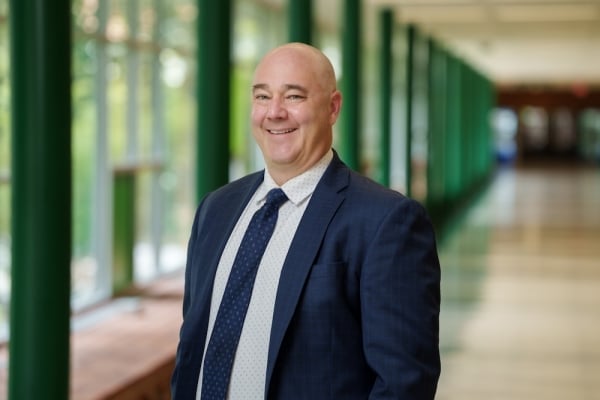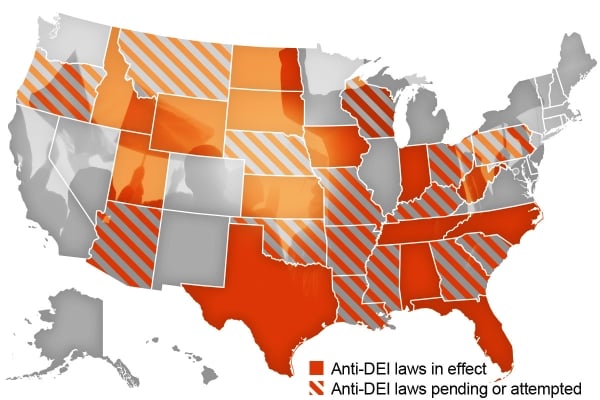“Chaos is the goal,” Mike Gavin, president of Delta College in Michigan, told a Zoom room full of higher ed professionals on a January afternoon. “These external forces are trying to cause chaos to distract us from our mission.”
By “chaos” he meant the onslaught of anti-DEI legislation sweeping the country—state laws requiring universities to scrub diversity statements from their hiring processes, identify DEI-related courses and programs for scrutiny, and cut personnel, centers and offices dedicated to supporting underrepresented student groups.
Over the course of an hour, Gavin and Stephanie Fujii, president of Arapahoe Community College in Colorado, took turns sharing practical bits of advice for college leaders and employees, should they find themselves in the legislative line of fire: what potential scenarios to prepare for, which offices should coordinate responses to anti-DEI legislation and how to communicate those responses to the campus community. Over and over again, they advised higher ed leaders: If there isn’t a federal or state law yet—or there’s wiggle room within the law—don’t overcomply.
“Don’t change anything until it is absolutely legally required,” Gavin told his colleagues.
More than 50 higher ed leaders and staff members took part in the training session by Education for All, a grassroots coalition of mostly community college administrators advising each other on how to fight legislative attacks on DEI. Gavin, who spearheaded the group, said the group has offered a series of trainings during the last six months or so, over Zoom and at conferences, to an estimated 1,300 people—with more to come.
What Gavin started two years ago as an informal community made up of a handful of concerned community college presidents has grown into a network of roughly 500 college administrators and higher ed association leaders, who not only conduct trainings but meet monthly on Zoom to hear from experts about the latest anti-DEI developments and talk about what they’re experiencing on their campuses.
“Many of our colleagues in states that have been impacted had to do this on the fly,” reacting to “divisive concepts” bills and DEI bans without a “playbook,” Gavin said. The trainings aim to distill and share concrete lessons learned in those states and serve as “venting sessions” for beleaguered higher ed administrators, dejected by the volatile political climate and looking for a sense of community. That climate has only become more fraught since President Trump issued an executive order on his first day in office to “combat illegal private-sector DEI preferences, mandates, policies, programs, and activities.”
Fujii told Inside Higher Ed that community college administrators in particular already have enough on their plates, worrying about how to meet local industry needs, scare up more funding and serve students with food and housing insecurity, among other tasks.
“That’s what we want to be able to focus on,” she said. But instead, they “have to go and deal with the Legislature attacking my mission,” or outspoken community members calling supports and services into question—not to mention the sometimes-fractious internal institutional disagreements about how to respond to anti-DEI efforts. “What I see when we do some of these trainings—or maybe what I tune in to—is the weariness. It’s exhausting.”
That sense of exhaustion, and hunger for community and solutions, was on full display at the training in early January, which Inside Higher Ed attended. One DEI professional in a swing state wrote in the Zoom chat that she didn’t want to sit back and watch supports for underrepresented students dwindle; she wanted examples of concrete strategies institutions have used successfully to protect their programs. She told the group she felt like efforts to close racial equity gaps in higher ed had barely begun before they came under attack. A community college administrator in a blue state worried aloud that, with Trump in office, even his institution might not be safe. He argued that maybe college leaders shouldn’t use the term “DEI” at all but find other ways to express the same goals.
Throughout, participants flooded the chat with resources: state bills to examine as possible case studies, tips for defending DEI work in media interviews and links to articles about anti-DEI measures laid out in Project 2025, a conservative blueprint for the second Trump administration, so they could better prepare for what might lie ahead.

Mike Gavin, president of Delta College, started Education for All two years ago to create a network of support for higher ed leaders defending DEI.
“We’re being very concrete about the reality,” Gavin said. “The paradox that a president or a cabinet member is in is that most of us want DEI to stay”—but at the same time, “we have to protect our institutions.”
Concrete Tools
Education for All gets granular in its advice to college leaders.
The recently launched Education for All website offers a variety of resources—some password-protected—including a template for responding to inquiries from policymakers about DEI-related courses and programs, examples of common language in divisive-concepts bills and ways to parse that language to defend curriculum choices. For example, the site provides an in-depth breakdown of the wording in North Carolina’s divisive-concepts bill to demonstrate how to refute bills’ various claims regarding the way colleges teach about race.
The group also developed tools to prepare institutions for possible federal policy actions related to DEI—as well as undocumented students, international students and LGBTQ+ issues—which turned out to be a prescient move in light of Trump’s anti-DEI executive order.
A detailed spreadsheet on the site helps institutions work through how they’d respond to a host of scenarios: challenges to diversity statements in hiring, cuts to DEI office budgets, prohibitions against data disaggregation by race or gender, on-campus actions by federal immigration enforcement officials, among other possible policies. For each scenario, campus leaders are asked to think about how different decisions would affect campus culture, what sacrifices—if any—are worthwhile and whether the policy is likely to be stalled by court challenges, buying time.
“We have spreadsheets and tools and handouts of how to plan ahead … or if there’s an impacted state, how to plan backwards, to rebuild and maintain the mission,” Gavin said.
Who Can Speak
Part of the thinking behind Education for All is that college leaders in states without proposed or enacted DEI bans can act as a support system for their colleagues in red states.
Julie White, chancellor of Pierce College in Washington State, said she got involved with the group because she sees it as her job to vocally support DEI at a time when many of her colleagues don’t have the same freedom, at least without fear of backlash from state lawmakers.
“I feel so privileged in the current context to be able to speak—and I actually don’t think it should be a privilege, I think it’s a right—but in the current context, that’s not everybody’s reality,” White said.
President of Lansing Community College Steve Robinson, another member of the group, believes community colleges are especially well positioned to advocate for DEI as institutions that tend to enjoy bipartisan support.
“Our entire enterprise is founded on an equity principle, an access agenda,” Robinson said. “I don’t see a lot of political disagreement about it when you boil it down to the core of what our institutions do and why they exist.” Four-year universities are often “fairly or unfairly criticized for having political leanings,” he said. But by and large, when it comes to community colleges, “you don’t see those perceptions.”
Still, Education for All trainings warn that “no one is safe.” Even in blue states, forces such as locally elected college governing boards can go after diversity initiatives.
Robinson said that in Michigan, higher ed institutions aren’t facing challenges to the same extent as red states “right now. That could change,” depending on the outcomes of local elections.
Fujii noted that because members of the group come from different regions and contexts, they don’t always agree on the right tactics to push back against what’s happening. They frequently discuss the pros and cons of openly supporting DEI versus serving underrepresented students in more under-the-radar ways. But one goal of Education for All is to offer a judgment-free zone with concrete tools, whatever the approach, she said.
“We don’t have to get caught up in that debate,” she said. “Instead, we’re trying to say, ‘Where are you at, and how can we help you?’”
To Gavin, the stakes of these trainings and resource exchanges are high.
“Our goal is really trying to help higher ed survive in a way that serves students,” he said.








